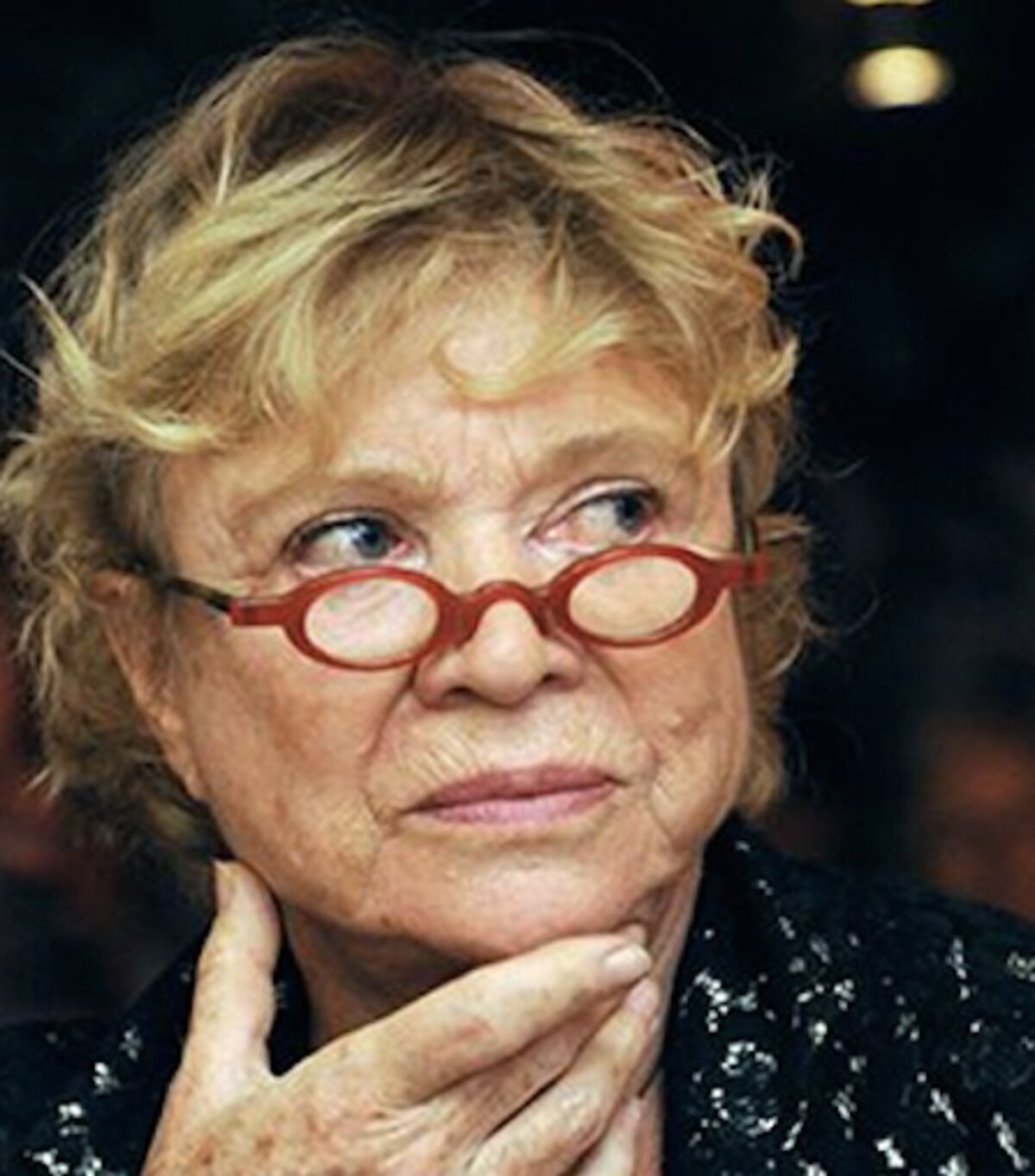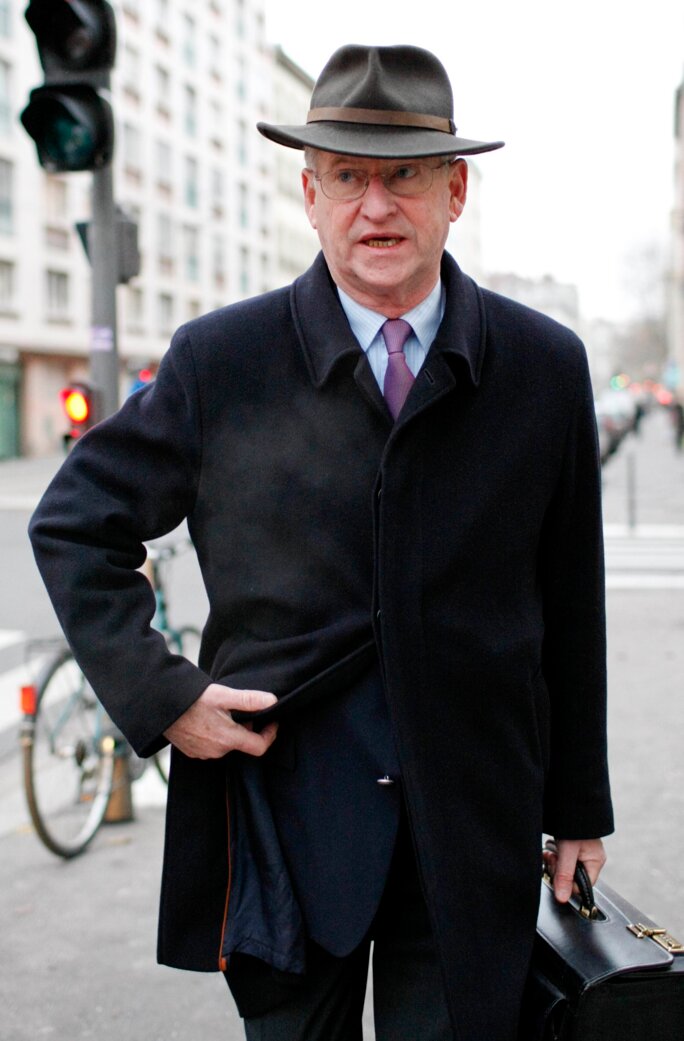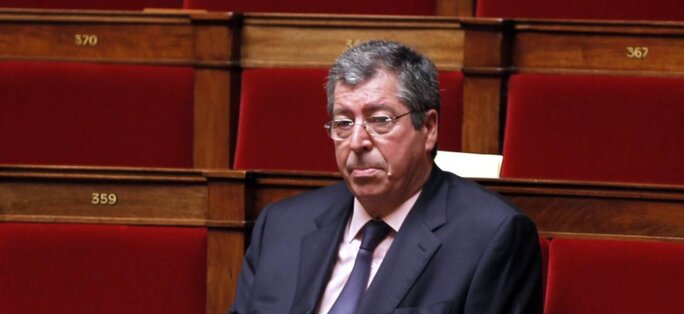Eva Joly is a high-profile anti-corruption activist and a former investigating magistrate specialized in financial crime. During her lengthy career in the French justice system, Joly, now 73, led several major and highly-complex investigations, notably the Elf sleaze case after which she returned to her native Norway to act as a government advisor on financial crime and corruption. She then later served as a special advisor to the Icelandic government in its investigations into the role of financial crime on the country’s economic crisis.
In 2009, back in France, she became a Member of the European Parliament (MEP) for the French Green party EELV, and ran as its presidential election candidate in elections in 2012. Still an MEP, she became a Paris-based lawyer in 2015, and is currently a member of the campaign team of Socialist Party presidential candidate Benoît Hamon, who is supported by Joly’s EELV party.
Éric de Montgolfier is a former public prosecutor who is also an advisor on judicial affairs in Hamon’s campaign team. Now retired, Montgolfier, 70, became well known notably for his prosecutions of protagonists in a major football bribery and match fixing scandal and, more recently, the HSBC moneylaundering investigation and a corruption scam within the Nice judiciary which led to the conviction of a judge for passing confidential information to members of his Masonic lodge.
In this interview conducted in Mediapart’s offices in Paris, Joly and Montgolfier are scathing of the culture of corruption amongst the political class in France – which Montgolfier calls “a republican monarchy” – within its institutions and even the wider public. They take a dim view also of what they describe as career-minded magistrates who refuse to ruffle the feathers of those in power, and call for much tougher sentences for white-collar crime.
Some, but not all, of the measures that they argue for here are contained in the socialist candidate’s campaign manifesto.
-------------------------
MEDIAPART: The fight against corruption is very rarely a political programme. Why?
Eva Joly: There is still a lot of ambiguity surrounding transparency and the fact of having something to hide. The way of thinking of politicians is “if one begins digging, we’ll find cases involving my old mates in the party, who are paid money from pharmaceutical firms on offshore accounts”, things like that. There’s an understanding, a neutralisation. I found this striking in the scandals surrounding [former French president] Nicolas Sarkozy, to see that [current French president] François Hollande never had a real go at him over those questions.
It’s an “understanding”, and that has nothing to do with what they call a “decent” electoral campaign. What is not decent is to receive funds from an old lady or to be unable to justify the origin of funds that allowed you to buy your first apartment in the town where you are its mayor, and to be elected French president in 2007 [a reference to Nicolas Sarkozy]. Over that there was a great silence.
I think this “understanding” goes back to the end of the [second world] war, to the agreements between the Gaullist and Communist parties on, for example, the management of water supply networks, something which for a long time funded political life, over decades.
MEDIAPART: It’s a sort of balance of terror?
Éric de Montgolfier: Yes. It’s a game we all know, “I’ve got a hold on you, you have a hold on me”. We are in a situation where, when a candidate has problems with probity, problems with money, it’s left alone. It’s even more sacred than sex in our country. The other candidates are uncomfortable. That doesn’t mean they’re dishonest, what it means is that to talk about a problem that affects a very large section of the political class would amount to breaking a pact - I was going to say a pact that is almost mafia-like. We are at the heart of complacency in the political class, one doesn’t talk about that because you never know what might happen in return. And it’s a shame, because the justice system is not at the heart of the debate.
MEDIAPART: Yet we are all concerned by the issue. Behind corruption lie victims.

E. J.: Yes, but the victim is abstract.
É. de M.: They are diffuse; they have difficulty in recognising themselves as a victim.
E. J.: Whereas in a murder, it is immediately apparent.
É. de M.: This phenomenon applies to the absurd notion of personal enrichment. You are told in all tranquillity that to steal from the community, that it’s for [the benefit of] one’s party, it is not corruption or misappropriation of public funds on the pretext that there was no personal enrichment. I regret that judges have accepted this notion, as can be found for example in the ruling by the Versailles appeals court over the sentencing of Alain Juppé.
Excuse me, but it seems to me that over 40 years I’ve convicted lots of people who took money from the pocket of a neighbour, and if they had said “it’s not for me, it’s for my grandmother” I’d have burst out laughing. Well, the nation doesn’t laugh when it’s told “it’s not for me, it’s for my party”.

Enlargement : Illustration 2

MEDIAPART: Especially because there is a form of personal enrichment by financing one’s political ascension to and appointment to posts, with all the favours and liberality that entails.
É. de M.: Of course. When the general secretary of the RPR [Editor’s note: the Gaullist conservative party that later became the UMP, now called Les Républicains] puts in place a system of fake jobs, he benefits also from this system because he is the general secretary of the party. How did we get to this absurd notion, which continues to prosper today?
MEDIAPART: How would you describe the situation we’re in, with a former French president – Jacques Chirac – found guilty of corruption, his successor – Nicolas Sarkozy – now placed under investigation in two judicial probes while about 30 of his close acquaintances are also placed under investigation, with two of his former ministers – Claude Guéant and Christine Lagarde – also sent for trial and convicted, while the leader of the ruling Socialist Party – Christophe Cambadélis – carries two convictions for financial crimes, a former socialist budget minister, Jérôme Cahuzac, found guilty of tax evasion, with the conservative presidential election candidate, former French prime minister François Fillon, placed under investigation (for misappropriation of public funds) and five judicial investigations involving the far-right Front National party?
E. J.: The first thing to say is that we’ve not won the battle against corruption. It is still there, and we have no reason to say that it’s diminished. I think it is linked to impunity. For decades, there have been opportune dismissals of cases, nominations of public prosecutors who are very close to politicians.
É. de M.: … and magistrates too!
E. J.: Certainly! I have a good opinion about the French justice system and the quality of French magistrates on an individual basis. I find them uncorrupted and that’s miraculous given the context we’re living in.
É. de M.: Even so, there is the case of the Azibert affair at the appeal court. And there was the conviction of Judge Renard in Nice. There are others, everywhere. One must stop repainting the justice system into a rosy picture.
E. J. : I’m not repainting it into a rosy picture, but I know a lot of justice systems other than ours and there are much worse. When I was a magistrate, I never had suspicions about colleagues around me.
MEDIAPART: Where does the problem lie?
E. J.: I have identified it at the level of the public prosecutor’s office, notably the Paris public prosecutor’s office, when I was an investigating magistrate. There was a will to slow down certain cases, a will to protect certain figures, with nebulous theories. But I did not find corruption was a problem within the corps.
É. de M.: It depends on what one understands by “corruption”. To receive money to do something somewhat limits the definition. I would not say that the judicial corps is corrupt. That there are corrupt individuals is certain. But when the great majority of the judicial corps interest themselves more in their careers than in scandals, we well have before us a phenomenon of corruption. It is the corruption of the public spirit and the judicial spirit. In 40 years of activity, I met a lot of magistrates who had more a sense of their own affairs than that of justice.
E. J.: That’s very true. When magistrates meet up, the number one subject of conversation is about careers. That raises the problem of the organization of the magistracy.
É. de M.: Absolutely. But one cannot dodge the other problem, that of the political class, and the problem of those who put in power people who have already provided the proof of their lack of probity. That’s what worries me most. How do you restore public spirit and give the population the sense of probity, which must be collective? When one talks to them about his scandal cases, supporters of François Fillon reply, “no matter, he’s our candidate”.
[...]
MEDIAPART: Do you find that there is a taboo in France over handing prison sentences for corruption?
É. de M.: Yes, it’s the monarchic temperament of the French people. There is still a sacred character lent to politics.
E. J.: We’ve seen it in lots of cases. Charles Pasqua, for example, given a one-year suspended prison sentence, the same day when a youngster, because he was a repeat offender, was given a one-year jail sentence without remission for stealing a CD. It’s a cultural issue. Faced with white-collar delinquency, judges have difficulty with imprisonment.
My theory is that there is a very strong identification mechanism. I think that the magistrates are very good for judging the humble, the weak, all those who don’t resemble them or who they can distinguish themselves from. But as soon as it involves men who they would like to have as a father-in-law, or as a son-in-law, and whose wealth they admire despite it all compared with their relative poverty, things are different. Psychologically, to be facing someone who’s rich and powerful, it’s more difficult for them.
Cultural inequalities are also very strong. I got to know that on arriving in France, and as an examining magistrate. The former CEO of the Crédit Lyonnais [bank], Jean-Maxime Levêque, said to me “I will answer your questions once you conjugate your verbs properly”. It was pure [as an example of the theories of why social hierarchies are maintained by sociologist Pierre] Bourdieu. Well, I placed him in preventive detention for six months, and I learnt my grammar.”
É. de M.: Magistrates sometimes have difficulty in projecting themselves regarding a certain type of delinquency. I sometimes had difficulty in obtaining proper sentences for tax evasion, until the day when I said that we’d all pay less tax if the fraudsters were better punished.
E. J.: It’s a problem in France. In matters of tax evasion, we receive too many small cases at a judicial level. Because of a lack of means, or political will. You never see a case where a multinational is accused of tax evasion.
[...]

Enlargement : Illustration 3

MEDIAPART: The financial crime branch of the public prosecutor’s office [the PNF, created in 2013] demanded and obtained a sentence of three years in prison against Jérôme Cahuzac.
E. J.: The PNF is progress. When the press reveals an offence, the investigation is immediately opened [Editor’s note: a reference to the scandal surrounding François Fillon]. That’s new. Under the reign of Jean-Claude Marin , when he was [the chief] Paris public prosecutor, Le Monde revealed, with facsimile evidence for proof, that the president of the senate, Christian Poncelet, had paid with cash from offshore accounts to have his villa renovated, and there was no investigation. Nothing.
É. de M.: It was the Parisian network. You don’t choose the Paris public prosecutor for his ability to prosecute the most powerful.
E. J.: That has also changed. The PNF is a positive evolution. The culture of impunity and corruption will tumble only under the weight of convictions. The idea must be established that there is a real danger for the fraudster, and also his advisors, those who put the system in place. I’d give as an example the convictions [for tax fraud] of the Nina Ricci perfume heiress and her lawyer, who was declared to be jointly responsible for the sums due.
These people know what they’re doing, like the CEOs of McDonald’s and Google. In cases like those, a well-chosen sentence for the lawyer who built the [financial] structure, for the bank and the financial director would suffice so that things change. When those people know that they are risking not only their freedom but also their wealth, I think it would have a very dissuasive effect.
É. de M.: It’s not that easy. Once you had obtained a choice, very exemplarily sentence, what will that lead to in terms of the public spirit? I cannot forget what was said by the electorate of Patrick Balkany [conservative MP and mayor of a Paris suburb] who were questioned in radio interviews about his return to office after serving his ban from holding political office [for corruption]. A woman of a certain age said, “He’s been convicted and so what? If you had the opportunity to take 250,000 francs, wouldn’t you take them?”
As long as you have that culture, it serves no purpose that there are judges who wear themselves out. When I prosecuted the mayor of [the Riviera town of ] Villefranche-sur-Mer [for illegally profiting from his position in public office] because he had swelled the coffers of his son, [regional daily] Nice-Matin carried out vox-pops and people said, “but what’s got to the prosecutor? The mayor is a good family man”. The reality is that, regarding corruption, we don’t have a democratic tradition in France. We are in a republican monarchy, without the traditions that are found in countries with a mostly protestant population.”
[…]
MEDIAPART: Has the creation, following the Jérôme Cahuzac case, of the High Authority for Transparency in Public Office, the HATVP, changed things?
E. J.: It represents an advance, because for once an institution has investigatory powers and it uses them. The offence of making a false declaration to the HATVP makes it possible to short-cut corruption. It works very well – in Greece for example where the failure to declare wealth allows for the conviction of corrupt MPs. What struck me in France was to see to what degree MPs were opposed to free access to their declaration about their wealth.
É. de M.: Tax secrecy must also be abolished. There would be plenty to think about. And to enforce the proper use of article 40 of the penal code [Editor’s note: which requires those in a position of public authority to alert the prosecution services if they are aware of a potential crime] by penalizing the refusal to denounce a serious offence.
Currently, the logic of statistical demand is hurting the justice system. A financial case like the HSBC case in Nice represents just one. It’s best to go after drug users. It is the problem with the numbers policy. You’re asked to account for the number of convictions, the number of minimum sentences. The statistical effect denies the justice system of some of its drive in economic and financial delinquency. And for police officers, the fight against white-collar delinquency is not a good investment in career terms. It would be best to have a corps of police detectives [police judiciaire] attached to the justice system. But with the same advantages.
MEDIAPART: In your opinion, is the current lack of resources of the justice and police services a question of negligence or political will?
É. de M.: For politicians, it simply allows a guarantee against the chickens coming home to roost. They’re not very keen to see counter-powers that could undress them in public and show what they get up to. There are a lot of things that need to change in this country, [including] the electorate, elected politicians and a certain number of your colleagues and mine. Symbolic measures must be found. The arrogance of the corrupt is simply the result of many years of impunity.
-------------------------
- This is an abridged version of the interview conducted in French, which can be found here.
English version by Graham Tearse


